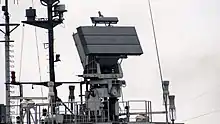Central acquisition radar (3D-CAR)
The central acquisition radar (3D-CAR) is a 3D radar developed by DRDO for use with Akash SAM capable of tracking 150 targets.
 Revathi radar, a derivative of 3D-CAR onboard INS Kadmatt | |
| Country of origin | India |
|---|---|
| Manufacturer | Astra Microwave Products Bharat Electronics Limited Electronics and Radar Development Establishment Entec Engineering Larsen and Toubro |
| Type | Primary surveillance radar |
| Frequency | S band |
| Range | greater than 200 km (120 mi) [1] |
| Altitude | 18 kilometres (11 mi) |
| Other Names | ROHINI REVATHI |
India has further developed its 3D CAR into all new ROHINI & REVATHI variants. The ROHINI is the Indian Air Force specific variant, whereas the REVATHI is for the Indian Navy. These replace the original joint development items such as the planar array antenna with new locally developed ones which are more capable than the original design. A third variant, known as the 3D Tactical Control Radar has been developed for the Indian Army and has cleared trials.
Details
Central acquisition radar (CAR) is a medium-range high-resolution 3D surveillance radar. Central acquisition radar was designed by LRDE, a DRDO laboratory, and is produced by a joint venture between BEL, Larsen & Toubro, Astra Microwave and Entec. The radar employs a planar array antenna and provides simultaneous multi-beam coverage. It can handle 150 targets in track while scan mode.
Rohini
The Rohini radar is mounted on a modified TATRA heavy truck and supported by a mobile auxiliary power unit. The TATRA is license manufactured by Bharat Earth Movers Limited (BEML).[2]
Features
These features relate to the 3D CAR radar. Specifications for the Rohini, 3D TCR and Revathi are available in the links below.
- Medium-range 3D surveillance
- S band operation
- Surveillance range more than 180 km
- Covers elevation of 18 km in height
- High-altitude deployability
- Deployment in less than 20 minutes
- 150 Targets in TWS
- Array of ECCM features
- Integrated IFF
- Capable of detecting low-altitude targets, and also supersonic aircraft flying at over Mach 3 speed
- Frequency agility and jammer analysis
Current status
BEL anticipates a requirement for 100 Rohini radars. BEL delivered the first ROHINI to the Indian Air Force on August 6, 2008. Around 20 radars can be manufactured annually.[3]
The ROHINI has a new Indian-developed antenna which is more advanced than that on the original CAR terms of power handling and beam forming technology.
Seven Rohinis were initially ordered by the Indian Air Force for their radar modernization program. The IAF then ordered 30 more radars after evaluation, making total orders 37 of the type.
The IAF has ordered eight Akash SAM squadrons, and the ROHINIs act as the central early warning system for an Akash squadron deployment.
The Revathi adds two axis stabilization for operation in naval conditions, as well as extra naval modes.
Two REVATHI radars were ordered by the Indian Navy for their P-28 Corvette program. Given that the Indian Navy intends to have up to 4-6 P-28 Corvettes, further orders are likely from the Navy as well.
Additional orders are also expected from the Indian Army if they order the Akash (missile) system.
The Indian Army is also expected to order another 3D CAR variant. The third Indian developed variant of the 3D CAR is known as the 3D TCR or tactical control radar, with a tracking range of 90 km. The radar has a lower antenna mount and is packaged in two vehicles instead of three for the Rohini. It can also feed data to a weapons station 20 km away. The radar cleared trials in 2008-09 and 29 numbers have been ordered to BEL. Overall, the 3D CAR program highlights India and DRDO's success in developing and manufacturing a modern 3D radar.
Gallery
 Indian Air Force Rohini radar in active usage.
Indian Air Force Rohini radar in active usage.